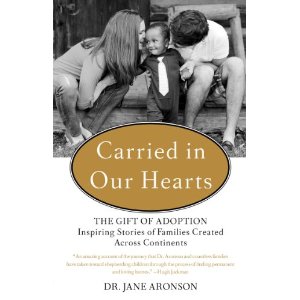 I’m thrilled to announce that Adoption Under One Roof blogger Lisa S has contributed an essay to a new and important book about international adoption, Carried in Our Hearts: The Gift of Adoption – Inspiring Stories of Families Created Across Continents. Authored by Dr. Jane Aronson and published by Tarcher, the book will be released on April 18, and is available for pre-order now, in both hard cover and Kindle formats.
I’m thrilled to announce that Adoption Under One Roof blogger Lisa S has contributed an essay to a new and important book about international adoption, Carried in Our Hearts: The Gift of Adoption – Inspiring Stories of Families Created Across Continents. Authored by Dr. Jane Aronson and published by Tarcher, the book will be released on April 18, and is available for pre-order now, in both hard cover and Kindle formats.
Carried in Our Hearts: The Gift of Adoption comprises a collection of essays written by adoptive parents whose families have been cared for by Dr. Aronson, aka “the orphan doctor,” during the past 20 years. The stories reveal the deep and complex emotions felt by adoptive parents, and will resonate with anyone who has embarked on this transformative journey. The chapters are divided into ten thematic sections–“The Decision,” “The Journey,” “The Moment We Met”–each introduced with an essay by Dr. Aronson. Throughout the book, Dr. Aronson discusses the arc of her life, from pediatrician, to adoptive mother, to founder of the international foundation, Worldwide Orphans; and her ongoing commitment to the “children left behind.”
For each book you purchase before April 18, Tarcher will donate $1 to Worldwide Orphans. Going forward, a portion of the book’s proceeds will continue to benefit the foundation.
Order your copy of Carried in Our Hearts today! I did, and cannot wait to read it. Particularly the contribution by Lisa S!
Congratulations! ~
Image Credit: Tarcher Publishing



 ShareThis
ShareThis
